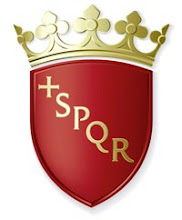
Piety is the virtue of justice by which man renders to the sources of his life and existence, both natural and supernatural, the honor, respect and, within due limits, the obedience that is a mark of gratitude for their giving us life and for their provident care.
In the first place we owe piety to God, the Source of sources, without whom we would have nothing, natural or supernatural. We are grateful to God as God, and to each of the Divine Persons who have created, redeemed and sanctified us. Secondarily, we owe it those who are the instruments of His creating, redeeming and sanctifying plan.
In the order of nature, this is first of all our parents, who with God gave us life and who provide for us. Secondarily, it is our nation, which gives us many civil benefits, especially freedom. This species of piety is usually called
patriotism.
In the supernatural order, we owe piety to the clergy who bring to us the Lord's many spiritual and sacramental gifts, as well as others, such as our parents, who had us baptized and raised us in the faith, as well as the many others who aided our spiritual formation and spiritual life.
Patriotism is, therefore, both a natural and Christian virtue, one that should be fostered within society. However, like all virtues it represents a mean, a moderate point between two vices, that of excess and that of deficiency. Patriotism which bears an extreme allegiance, without regard to the truth or the common good, is a vice. It goes under various names, such as jingoism or nationalism. The lack of patriotism is also vicious, an indifferentism to the good of society and the nation. Both have pride at the root, either pride in one's country as an extension of one's own ego (the vice of excess), or an egotism that admits no other allegiances, including country, except my own (the vice of defect).
There are always both with us in society, of course, but programs and plans that put the common good and the good of individuals, especially their moral good, beneath the good of the party or the support of a party prorgam, are vicious, as are all forms of political corruption.
To demand that we be "patriotic" and die when sick "for the good of the country" is particularly evil, since "life" is the greater natural right. This evil is aggravated by the fact that the money saved will be used to further political corruption and be diverted to cronies and special interests.
St. Camillus pray for us!
SPQR
 "The budget should be balanced, the Treasury should be refilled, public debt should be reduced, the arrogance of officialdom should be tempered and controlled, and the assistance to foreign lands should be curtailed lest Rome become bankrupt. People must again learn to work, instead of living on public assistance."
"The budget should be balanced, the Treasury should be refilled, public debt should be reduced, the arrogance of officialdom should be tempered and controlled, and the assistance to foreign lands should be curtailed lest Rome become bankrupt. People must again learn to work, instead of living on public assistance."





